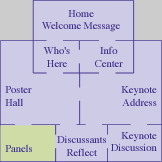|
This year we are very fortunate to have five panels that address different challenges faced by the LSCs. Your participation in each of these panels will enable the LSCs to bring together their perspectives about these issues which are relevant to other systemic reform initiatives as well as to the upcoming MSP (Math and Science Partnership) initiative. We also invite and encourage the participation of our discussants who have the perspective of having been involved in multiple reform efforts.
- Public Engagement: Addressing the political, cultural and constraining factors influencing math reform.
Panelists: Bill Frascella, Joe Merlino, Carol Fry Bohlin
Although LSCs are "systemic" initiatives in that they serve whole school districts and align professional development with curricula and assessment, each lives within a larger context. When the project's goals, aims, or vision become out of sync with those promoted by their State or powerful political groups, differences must be negotiated. Such difficulties have perhaps been faced most directly by LSCs in states engaged in fierce debates over math curricula and standards. In our first panel, "Public Engagement," we present three cases from Indiana, Philadelphia, Pennsylvania, and California. We invite you to share your experience from your state.
- Making the case for creating a continuous school improvement infrastructure?
Panelists: Mark St. John and Mike Klentschy
How does one sustain, continue, and deepen a professional development effort supported by NSF once the grant ends? Mark St. John challenges funders, superintendents, and Principal Investigators to consider creating a continuous school improvement infrastructure. Mike Klentschy, superintendent of El Centro School District in California and PI of two LSCs, offers his reaction to Mark's proposal. We invite you to join in and voice your opinions to this proposal.
- Uses and abuses of data in professional development
Panelists: Nancy Love, Mark Jeness, Mike Howard.
Many argue that professional development should be data driven, but what kind of data is most useful? Data can be derived from student scores on state assessments, from tests of teacher competence accountability, or from examination of students' work. This panel discusses effective uses of data as well as potentially harmful uses of data in professional development. Perspectives are provided by Nancy Love, who has recently authored "Using Data/ Getting Results," as well as by two lead evaluators of the LSCs, Mark Jeness and Mike Howard. Please join us in this discussion.
- Addressing competing reforms through the integration of science and literacy: two case studies.
Panelists: Elaine Woo and Jerry Valadez
While the LSCs are primarily concerned with math and science reform, these are not the only reform agendas being implemented by school districts. With an increased emphasis on high stakes math and literacy tests, science can be "pushed to the back burner." Elaine Woo and Jerry Valadez present case studies of two projects that have integrated science and literacy. They speak of the benefits and the potential drawbacks. We invite your perspectives, questions, and participation.
- From an LSC to "fee for service"
Panelist: Reeny Davison
By popular demand, we have invited Reeny Davison to discuss a successful transition from an LSC to a fee-for-service program that not only continues to serve the districts involved in the LSC but has expanded its reach. As projects search for sustainable models for their efforts they will want to engage in conversation with Reeny Davison about this transition.
|


